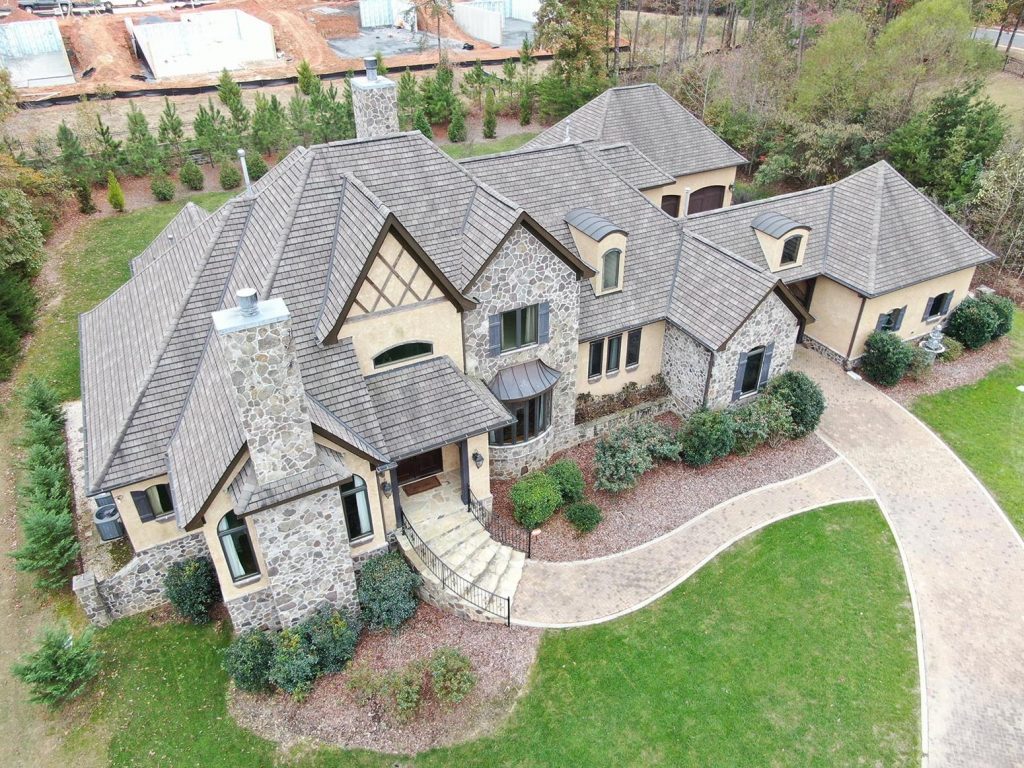If you are in the process of replacing your roof, choosing the best roofing material for your home is one of the first steps. It’s vital to consider aesthetics and functionality when you need a new roof. Various roofing material choices are available, but synthetic slate roofs and asphalt shingles are stylish.
Which of these two is a better option for you? It comes down to you, but before you decide, we’ve highlighted the differences between asphalt shingles vs slate roofing!
Cost
It’s only natural that money is the primary consideration when deciding on a suitable roofing system. However, when discussing the cost of replacing your roof, it’s essential to consider the value for money of the choice you make.
Asphalt shingles are one of the most affordable solutions, and you can acquire them for as little as $70/100 square feet of roofing, depending on the brand. Roofing contractors should use high-quality roofing material from trusted manufacturers such as Owens Corning, Certainteed, or GAF.
You can’t call synthetic-slate roofing a budget-friendly option in terms of the initial investment. However, synthetic slate roofing boasts lower roof maintenance costs, and synthetic slate roofing’s durability will help you avoid problems that might require roof repairs or, in worst-case scenarios, another roof replacement earlier than expected. The synthetic slate tile roof expected lifespan is significantly longer than asphalt shingles. Synthetic slate roofing offers an expected lifespan of 50 or more years when installed on a roof properly, and asphalt shingles average between 20-30 years.
For the cost of a new roof using synthetic slate roofing, experts recommend that you contact a local roofing contractor familiar with synthetic slate roofing installation.
Installation
You should always put roofing installation into the hands of professionals, which minimizes the risk of improper installation. Improper roof installation can lead to roof leaks and impact the warranty offered on your roofing materials.
Installing asphalt shingle is not recommended as a Do-It-Yourself project. If you are not an experienced roofing contractor, you may not realize that there are required installation guidelines that ensure the protection of your roof. Those include:
- Improper starter shingle installation – securely connecting the shingles to the roof is vital. Otherwise, even the slightest wind could lead to shingle detaching.
- Improper sealant strip placement – the strip’s task is to connect the shingles and make them work as a single unit. That increases their impact resistance and durability.
- Problems with fasteners – if the installer underdrives the fasteners, the strip won’t have a good connection with the overlying shingles. Overdriving could even damage the shingles while high fastening disrupts wind resistance.
Although the material is significantly heavier, synthetic slate roofing doesn’t have the same risks connected to the installation process. Depending on the roof size and other factors, both roof types could take a day or two to complete the roof replacement.
Impact Resistance
Asphalt shingles have a layer of protective granules designed to protect them. With age and extreme weather, those granules can wear off over time. If the temperatures are often changing, they can make the shingles brittle and susceptible to breaking or cracking, inevitably leading to roof leaks. The same applies to unusually high or cold temperatures.
According to Greg Scott of Houston Home Remodeling Professionals, synthetic slate roofing has improved weather and impact resistance. It can handle rain, wind, and other severe weather conditions while ensuring optimal interior protection. Synthetic slate roofing can save money on frequent repairs and replacement.
Which Is Better – Asphalt Shingles or Slate Roofing?
Asphalt shingles have a lower cost for initial investment, making them the more affordable roofing option. Shingle brands such as Owens Corning offer more durable roofing material, but the lifespan is still significantly lower than synthetic slate roofing. Asphalt shingle’s potential roof maintenance costs are higher and might cause you to think twice. Unless installed by a trusted roofing company, asphalt roofing should have issues with extreme temperatures and weather conditions. We know that roofing is the first line of defending your home against environmental factors, and problems with the roofing system can easily lead to issues with the property’s structure.
On the other hand, synthetic slate roofs have impressive impact resistance. That includes dealing with fire, water, wind, and other extreme weather conditions. The slate roofing offers a simple installation with less risk of something going wrong. The final decision is yours, but synthetic roofs can be a wise choice if you need a long-term solution.
Want to learn more? Check out our shingle-type buying guide below!
Like what you read? Check out our guest writer:
Skylar Ross is a freelance writer and contributor for Phoenix Roofing Contractors. He specializes in writing home improvement, building construction, and innovative building materials articles.

